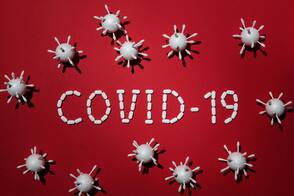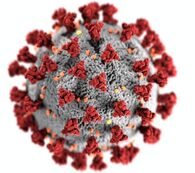|
BY: CAPRI MILLS Hi! My name is Capri Mills. I'm a junior in high school and have a passion for science, psychology, and writing. I also enjoy giving back to the environment and my community in any way I can. After high school, I plan to continue on a neuroscience path throughout college and beyond.  As we all know, COVID-19 has dominated our lives these past few months, with signs about it in every store and new mandates announced nearly weekly. Although many news stations broadcasted stories about the virus seemingly nonstop, many people still don’t know the exact science of it. But they should—it’s imperative to know what exactly will happen to your body if you get the virus based on the knowledge of what has happened to the bodies of those who have gotten it. Before we get into the nitty-gritty of COVID-19, though, let’s talk about what it actually is. Well, as we all know, it’s a virus. But viruses are often misunderstood. Contrary to popular belief, viruses aren’t actually alive (McNeil). Instead, a virus is a strand of genetic material, either DNA or RNA, rolled up inside of a protein shell. And despite being clever and mutating to fit environmental conditions, viruses cannot survive long without a host (McNeil). That’s why they need us. Inside of our bodies, they can use our own cells against us to do the dirty work. They do this by hijacking our cells and forcing them to reproduce the virus’s genetic code, making as many of themselves as possible (Gelderblom).  Let’s turn to coronaviruses in particular now. All coronaviruses have a “spiky” shell, which is why their prefix is corona since it’s Latin for crown, precisely what the spikes look like underneath a microscope ("What Is Coronavirus? The Different Types of Coronaviruses."). These spikes, while good for the virus, are problematic to us. They allow the virus to survive for a long period without a host and attach themselves to cells. But unlike other coronaviruses, COVID-19 attaches to cells in our lower respiratory tract, not our higher one. This is where it gets into the lungs, heart, kidney, liver, brain, and more (Goldman). Inside of the lungs, COVID-19 leaves damage in its wake as it attacks more and more cells, creating symptoms like fever and low blood pressure (Paul). It first strikes the epithelial cells (kind of like our body’s shield) in our airways, leaving our body undefended to fluid and debris (“Learn about COVID-19”). Later, COVID-19 moves on to invade the air sacs, called alveoli, in our lungs. This is especially bad because when the alveoli become too damaged and inflamed, pneumonia ensues, leaving the possibility of long-lasting damage, like shortness of breath. Moreover, the type of pneumonia COVID-19 causes is said to leave your lungs looking like ground-up glass, and if pneumonia progresses, it can turn into acute respiratory distress syndrome, which is where the alveoli fill with fluid, making it hard to breathe (Seladi-Schulman). It’s evident that COVID-19, though portrayed by some to be merely a short-term illness, certainly can leave a lasting impact on its victims. As always with science, knowing how viruses invade and damage cells are important, as it can hopefully help us protect against them. So stay knowledgeable. Works Cited Gelderblom, Hans R. "Structure and Classification of Viruses." Medical Microbiology. 4th Edition. U.S. National Library of Medicine, 01 Jan. 1996. Web. 14 June 2021.
Goldman, Bruce. "How the Coronavirus Destroys Cells and How Scientists Attempt to Disarm It." Stanford Medicine. 15 Oct. 2020. "Learn about COVID-19." Learn about COVID-19 | American Lung Association. Web. 14 June 2021. Paul, Marla. "Why COVID-19 Pneumonia Lasts Longer, Causes More Damage than Typical Pneumonia." Why COVID-19 Pneumonia Lasts Longer, Causes More Damage than Typical Pneumonia. 11 Jan. 2021. Web. 14 June 2021. Seladi-Schulman, Jill. "What to Know About COVID-19 and Pneumonia." Healthline. Ed. Meredith Goodwin. Healthline Media, 09 June 2020. Web. 14 June 2021. McNeil, Taylor. "What Are Viruses and How Do They Work?" Tufts Now. 03 Apr. 2020. Web. 14 June 2021. "What Is Coronavirus? The Different Types of Coronaviruses." UKRI. 25 Mar. 2020. Web. 14 June 2021.
1 Comment
BY: CAMERON YUEN Hello! My name is Cameron Yuen, a current senior in high school. I'm going to be attending Tufts University, and I intend on studying Computer Science. I want to use technology to incite change, whether it's bridging the digital divide, aiding public health or bolstering sustainability efforts. Outside of academics, I'm a competitive diver and an avid Overwatch player!  With tests accumulating on our schedules, pressures to perform well piling on from those around us, and the gargantuan task of managing the college admissions process looming over students across the country, we all wish there were alternate ways to succeed. Average GPAs and standardized test scores are at an all-time high, and we all scramble to include ourselves in those statistics in an effort to appear impressive. The system seems to demand all of our time and energy, to produce results that outshine everyone else. However, fostering this mindset, in my experience, only disillusions you into thinking you’ve improved as an individual. Countless times in my battle with the Common App, I’ve felt pressured to have filler content in my awards and extracurriculars section, so I scrambled around school and the Internet to feign more passions. That mentality didn’t take me far. Although I was able to put more words in my essays and activities sections, that’s all that they were — words. They didn’t present any other dimension about myself and surely didn’t demonstrate interest, because they were so disjointed from my core identity they didn’t make sense to be there. Stuck trying to weave a thread between each aspect of my application, I struggled to fully express my journey as a human being, and instead sounded like a robot programmed into the admissions process. I, towards the end of the journey, did clean up my application and let my selfhood shine more which is where I believe my acceptances stemmed from. However, I wouldn’t consider it a complete success; I still believe I made plenty of mistakes. In retrospect, to have improved my standing I would’ve had to change my attitude before I even started thinking about colleges. On the surface, I’ve known for a while that STEM topics piqued my interest, and went about my school career chasing ways to express that. Between taking the hardest classes and achieving high grades in those fields and forcing myself into STEM-based volunteer work and clubs, I felt like I was doing everything correctly. But looking back, I was missing the most critical aspect: growth. I never let the seed of my STEM interest blossom into what it was meant to be; instead, I forced it to become what I thought would be most presentable. I thought that those results would increase my utility in the future, but in reality, only maturing and learning can do that. Simply put, subscribing to the natural course of human growth not only improves your aptitude but facilitates your journey to becoming the person you want to be.  However, many people don’t believe this mentality works for everyone. It makes total sense that this path seems impractical at times, as people’s interests don’t always align with a lucrative career. On the surface, I can agree, but with deep introspection and exploration of what’s out there, I think any interest can become fruitful. For example, I’ve always been obsessed with video games, yet have only viewed them as a hobby, as video game development didn’t interest me. But if I had let my love for gaming and STEM subjects grow alongside one another, I would’ve seen far more possibilities. If I decided to start streaming on Twitch or creating YouTube content in gaming, I may have discovered that I enjoy editing/graphic design and audio engineering, both of which companies in diverse fields demand. Even with more specific interests like soap carving or bird watching, there still are advantageous paths to follow as long as you let them grow. For example, through soap carving, you may find that market bar soaps are not as ergonomically designed as they could be, and you could delve into engineering psychology to restructure how companies think to make soap. With bird watching, maybe you’ve begun to catalog your findings and publish them, building a proclivity to express your observations about nature in writing. From there, maybe you’ve begun to appreciate that art form and could start using those writing samples to get involved with TV and movie scriptwriting, novel and poem authorship, or nature journalism. So if you’re ever questioning what direction your interests can take you, think about them like plants. Regardless of what seed you start with, if you give it the correct space and resources to grow, it will always produce oxygen, just like how all of our interests can make meaningful contributions to the world. Works Cited Barber, Nathan. “Focus on the Process and Results Will Follow.” Edutopia, George Lucas Educational Foundation, 2 Oct. 2014, www.edutopia.org/blog/focus-process-results-will-follow-nathan-barber.
|
Quest Student Research InstituteOn Science, Computation, Medicine, and Academic Success Archives
January 2022
|

 RSS Feed
RSS Feed